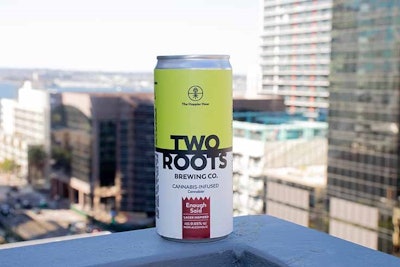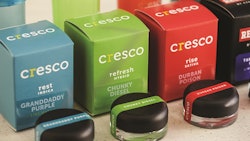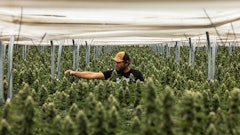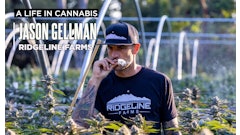
Last summer, Cannabiniers launched Two Roots Brewing Co. just as Constellation Brands was making international headlines with its blockbuster investment in Canopy Growth Corp.—a sure sign that the cannabis-beverage market nexus was emerging as a source for innovation. Two Roots quickly and quietly picked up consumer interest in Nevada, where the launch took place.
Victor Jerez, president and COO of Cannabiniers, said he’d been watching the cannabis industry manifest since observing California’s Prop. 19 victory in 2010. The stirrings of a regulated marketplace were becoming clear, and Jerez, enmeshed in a career in the global spirits industry, saw an opportunity. By the time he joined Cannabiniers earlier this year, he’d founded like-minded team members, like founder Michael Hayford, who felt the same way. Two Roots was already off to an enticing start.
Furthermore, Jerez has a thesis that he’s eager to test in the market: “Beverage cannabis, made correctly, … is an easy on-ramp to mainstream consumption of cannabis,” he says.
In describing his new position to his mother-in-law, he offered her a can of Two Roots. She demurred. But Jerez framed the new product with a familiar point of reference: good, old-fashioned beer. “It’s going to be different, but it’s going to be similar,” he told her. She ended up enjoying it, finding the beverage a neat entrance into the growing complexity of the legal cannabis industry. (Two Roots’ cannabis beer comes in five classic beer styles: lager, stout, New West IPA, blonde ale and wheat.)
The broader test is going to be the North American consumer marketplace. And with major consumer-packaged-goods investments beginning to flood the cannabis space, the idea that a cannabis beverage could pick up significant public interest is the hypothesis at the heart of Jerez’s mission.
Part of this prospective growth, Jerez says, is driven by overarching trends in how we discuss health and wellness across North America. “If one could come up with a proposition that married the attributes of cannabis with beverage alcohol—adult beverages—that could be a really strong, winning proposition,” he says, reflecting on how Hayford built the company’s strategy. “Take the great attributes of alcohol, which is an elevated, social-lubricant experience, and you strip out some of the not-so-desirable aspects of alcohol. … Getting a beer belly, putting on those extra calories? That’s the least of it, but there it is.”
By pivoting to cannabis—a different sort of intoxication without the pounding hangover and heavy-duty carbs—well, there’s a demand for something like that. It’s clear in the food sector, and it’s an undeniable support system for the nascent cannabis industry.
Within that industry are the shifting sands of product categories: Flower is being displaced, to some degree, by the discreet simplicity of vape products. Low-THC topicals and edibles are finding their place in the market. Beverages, however, are a newer phenomenon. But they’re growing rapidly.
“This is a very, very tough category to build out,” Jerez says. “Number one, the science is not easy. … Onset time is fundamental. You have to be able to sell titration. You have to have that feedback loop tight enough that you can know when you’ve had too much before it’s too late. You have that [in alcohol], typically—it’s ingrained into usage patterns of alcohol. You learn pretty quick.”
Jerez contrasts this idea with the metabolization of THC in edible products: titration is anywhere from 45 minutes to two hours in many cases. There’s a level of uncertainty that’s difficult for new consumers to surmount. “That is a huge, huge challenge. Having grown up in the spirits world, … ‘responsible drinking’ is not only a buzzword but it’s a code of behavior. We’re in a highly regulated industry.”
That’s a complicated issue to communicate to consumers. The products being sold by Two Roots Brewing Co. aren’t exactly beer and they aren’t exactly an infused cannabis edible. How will the rest of the night go after one Two Roots beer? After two? This is an emergent product category and an emergent social experience.
Two Roots’ 10-oz. beers each contain less than 0.05-percent alcohol and 2.5 mg of THC—typically absorbed by the body within five to seven minutes. The product is meant for casual consumption in a social environment.
The natural follow-up to product manufacturing and the marketing behind these products is the actual pathway to retail. This is a narrow road to walk, as opposed to global alcohol distribution; cannabis beverages can only be sold on licensed dispensary shelves.
And when a retail business is selling beverages, that shop needs some sort of cooler; there’s just that simple matter of the physical space required to sell beverages. The retailer also needs some sort of approach to explain cannabis beverages and the science of titration to customers. Much like topicals have their place in many retail stores—and the specific knowledge from budtenders required to explain these products to customers—cannabis beverages will need their own space, their own niche in the broader universe of cannabis offerings.
At Las Vegas ReLeaf, a Two Roots tasting bar greets customers while they’re waiting to get in line in the shop itself. (Two Roots retails for $8 per can in Las Vegas.) There, at the bar, customers can learn more about this new product and make that connection to the draft handles one might find at a familiar neighborhood bar.
Then, once they’ve headed into the dispensary proper, Two Roots is waiting, in coolers behind the counter.
























